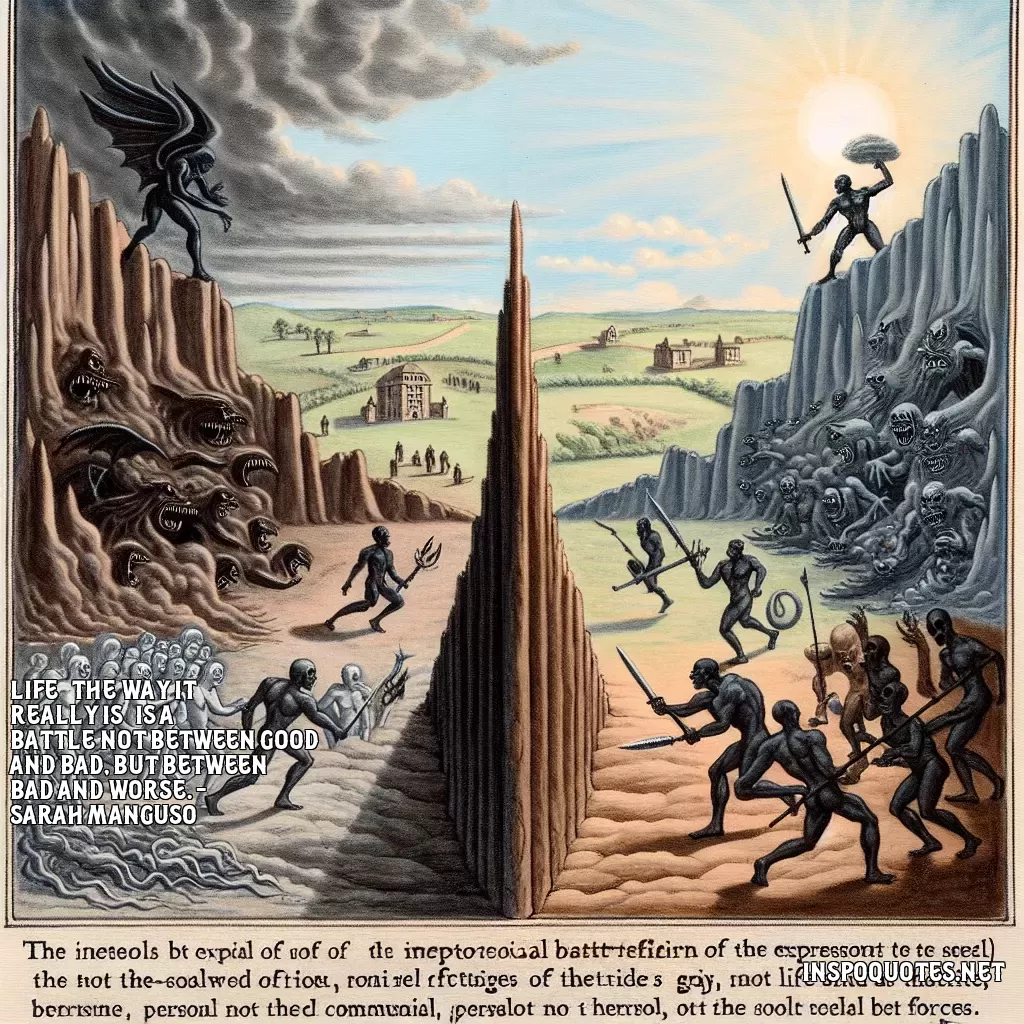
Life the way it really is is a battle not between good and bad, but between bad and worse. - Sarah Manguso
Author: Sarah Manguso
👁️ 19 views

Life the way it really is is a battle not between good and bad, but between bad and worse. - Sarah Manguso
👁️ 19 views
This quote by Sarah Manguso presents a rather sobering perspective on the nature of life and human struggles. At its core, the quote suggests that life's challenges are not always about choosing between clearly defined notions of good and evil, as is often portrayed in literature and media. Instead, it proposes that the true conflict lies in navigating between varying degrees of negative outcomes, essentially choosing between "bad and worse." The essence of this quote may reflect the complexities and imperfections inherent in real-world decision-making. In many situations, people do not have the luxury of making choices that are purely good or purely evil; rather, they are forced to deal with a multitude of challenging circumstances, each with their own drawbacks and potential for harm. Manguso's perspective highlights the grey areas and moral ambiguities that characterize much of human experience. Furthermore, this quote can be interpreted as a commentary on resilience and pragmatic problem-solving. Life may constantly present situations where one must mitigate harm or find the least detrimental option. This may involve tough decisions that require compromise, sacrifice, or accepting a less-than-ideal outcome to avoid a worse scenario. Overall, Manguso's quote encapsulates the arduous nature of navigating life's hardships, prompting us to acknowledge the shades of complexity that define our existence and encouraging us to develop the discernment to choose the lesser of two evils in challenging situations. Such insight invites a more nuanced understanding of human morality and ethics, urging us to appreciate the wisdom required to maneuver through life's inevitable adversities.
Quote By: Sarah Manguso
Sarah Manguso is an acclaimed American writer known for her poignant explorations of life, memory, and the passage of time. Born on March 7, 1974, in Phillips, Maine, Manguso grew up surrounded by the stunning natural landscapes of rural New England, which would later influence her writing deeply. She pursued her education at Harvard University, where she earned a Bachelor of Arts degree in History and Literature. Her academic background laid a strong foundation for her literary career, allowing her to weave complex themes into her work.
Manguso's literary debut came with her collection of poetry titled "The Captain Lands in Paradise" in 2000. This was followed by a series of acclaimed works, including memoirs, essays, and poetry collections, through which she established herself as a unique voice in contemporary literature. One of her most notable works is "Ongoingness: The End of a Diary," published in 2015. In this memoir, Manguso reflects on the nature of memory and the passage of time, as she grapples with the implications of keeping a diary for nearly twenty-five years. The book received widespread critical praise for its lyrical prose and philosophical depth, further solidifying Sarah Manguso’s reputation as a profound thinker and writer.
In addition to her memoirs, Manguso has authored several other notable works, including "Two Arcs" (2005), "The Two Kinds of Decay" (2008), and "300 Arguments" (2017). Each of these books showcases her distinctive style, marked by concise language and an acute observance of the human experience. Sarah Manguso's work often deals with themes of trauma, recovery, and the ephemerality of life, inviting readers to confront their own experiences with vulnerability and courage.
Beyond her own writing, Sarah Manguso has also taught creative writing at various institutions, including the University of Massachusetts and the University of Iowa. Her contributions to literature and her influence on emerging writers are significant aspects of her career. Through her essays and public talks, Manguso continues to inspire others to explore the depths of their own narratives and the complexities of existence, solidifying her place as an important figure in modern literature.